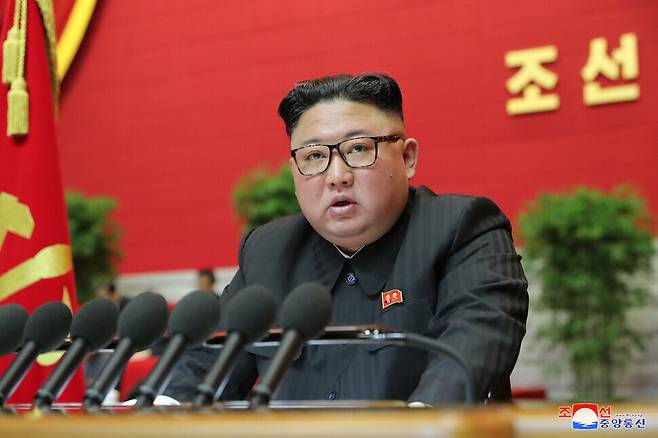[Editorial] One side alone can't resurrect the inter-Korean "spring" of 3 years ago
전체 맥락을 이해하기 위해서는 본문 보기를 권장합니다.
On Jan. 9, the Rodong Sinmun newspaper quoted North Korean leader Kim Jong-un as saying he plans to tailor Pyongyang's foreign policy to the attitude and actions of the US and South Korea. During a session of the 8th Workers' Party of Korea Congress, Kim said he plans to approach the US "on the principle of power for power and goodwill for goodwill," explaining that the "key to establishing [a] new DPRK-US relationship lies in the US withdrawal of its hostile policy toward the DPRK."
Kim laid out plans to develop nuclear-powered submarines and other forms of nuclear armament with the aim of "attaining an advanced capability for making a preemptive and retaliatory nuclear strike." The WPK rules were also revised with a new provision about "safeguard[ing] the stability and peaceful environment of the Korean peninsula" through "powerful defense capabilities."
이 글자크기로 변경됩니다.
(예시) 가장 빠른 뉴스가 있고 다양한 정보, 쌍방향 소통이 숨쉬는 다음뉴스를 만나보세요. 다음뉴스는 국내외 주요이슈와 실시간 속보, 문화생활 및 다양한 분야의 뉴스를 입체적으로 전달하고 있습니다.

On Jan. 9, the Rodong Sinmun newspaper quoted North Korean leader Kim Jong-un as saying he plans to tailor Pyongyang’s foreign policy to the attitude and actions of the US and South Korea. During a session of the 8th Workers’ Party of Korea Congress, Kim said he plans to approach the US “on the principle of power for power and goodwill for goodwill,” explaining that the “key to establishing [a] new DPRK-US relationship lies in the US withdrawal of its hostile policy toward the DPRK.”
South Korea, he said, would be treated “according to how they respond to our just demands and how much effort they make to fulfill the north-south agreements.” This suggests Kim is leaving the door open for dialogue with Washington and Seoul, but putting the ball in their court rather than reaching out first.
Kim’s remarks suggest that the unstable situation on the Korean Peninsula is likely to continue for some time. This means avoiding further provocations is essential. To begin with, Pyongyang needs to refrain from nuclear and missile testing or any other shows of force that might increase military tensions. Hopefully, the newly arriving Joe Biden administration in the US will quickly signal to Pyongyang that it wants dialogue.
In his remarks, Kim was quoted as saying, “[W]hoever takes power in the US, its entity and the real intention of its policy toward the DPRK would never change.” He also called for “orient[ing] political activities with the main emphasis put on prevailing over and subjugating the US.” Calling the US “our principal enemy” may sound harsh and provocative, but it’s a potential signal of how interested he is in normalizing relations with Washington.
Kim laid out plans to develop nuclear-powered submarines and other forms of nuclear armament with the aim of “attaining an advanced capability for making a preemptive and retaliatory nuclear strike.” The WPK rules were also revised with a new provision about “safeguard[ing] the stability and peaceful environment of the Korean peninsula” through “powerful defense capabilities.”
Even when we consider how anxious Pyongyang is about its security, this is a worrying development, one that could lead to military confrontation and an inter-Korean arms race, a tit-for-tat power competition that only ends up jeopardizing our national security. We should remember the declarations by the South and North Korean leaders in 2018, where they pledged to carry out “disarmament in a phased manner” and to achieve peace based on trust and the execution of agreements rather than peace based on force.
Kim described the current state of inter-Korean relations as a “catastrophe,” saying they had been “brought back to the time before the publication of the Panmunjom Declaration.” At the same time, he suggested the relationship “may return to a new starting point of peace and prosperity in the near future [. . .] as they did in the spring three years ago, depending on the south Korean authorities' attitude.”
It’s wrong for him to pin responsibility for the chill in inter-Korean relations on Seoul alone. The sort of “spring” that arrived on the peninsula three years ago isn’t something that happens through the efforts of just one side. Both sides need to make an effort. We look forward to seeing South Korea and the US show more flexibility on the issue of their joint military exercises scheduled for this March, which can be a new inflection point in easing tensions. We’d also like to see North Korea respond more proactively to the South’s demands for dialogue, starting with those concerning humanitarian issues.
Please direct comments or questions to [english@hani.co.kr]
Copyright © 한겨레. 무단전재 및 재배포 금지.
- 6살 숨지게 한 ‘낮술 운전’ 징역 8년…“구형보다 약한 처벌”
- 막오른 선거…안철수·나경원 ‘잰걸음’, 스텝 꼬인 오세훈
- 괌 침입종 뱀의 비결, 올가미로 전봇대 오르기
- “이루다 개발사, 연인 카톡 대화 수집하고는 돌려보며 웃었다”
- [영상] 그물에 갇혀 19일, 피 흘리며 죽어간 어린 밍크고래
- ‘미래에 대한 책임’ 첫 소송…정부 이긴 환경단체, 석유회사 조준
- “소행성 궤도를 바꿔라”…아마겟돈 실험이 시작된다
- 여의봉처럼 스마트폰-태블릿 변화무쌍…‘LG 롤러블’ 깜짝 공개
- ‘그날’도 아니고 ‘마법’도 아니고 ‘생리’입니다
- ‘연쇄 이동’ 여자배구 세터 ‘춘추전국시대’